17 Women Who Changed the Course of LGBTQ+ History

- Oops!Something went wrong.Please try again later.
- Oops!Something went wrong.Please try again later.
- Oops!Something went wrong.Please try again later.
- Oops!Something went wrong.Please try again later.
LGBTQ+ Women Activists Who've Made History

Women haven't always gotten their due recognition in the LGBTQ+ rights movement, but they have always been there, and they have won some of the most important victories in the march toward equality. In observance of Women's History Month, we present some of the most significant LGBTQ+ women activists of the 20th and 21st centuries.
From left: Mary Bonauto, Margarethe Cammermeyer, Kelley Robinson, and Urvashi Vaid
Del Martin and Phyllis Lyon

Marcio Jose Sanchez/AFP via Getty Images
Legendary couple Del Martin (left) and Phyllis Lyon (right) were true pioneers of the LGBTQ+ rights movement. They were partners in love and activism for more than 50 years. They met in Seattle, where they both worked on a magazine, in the early 1950s and soon moved to San Francisco, which was their home base for the rest of their lives. In 1955, they and three other lesbian couples founded the Daughters of Bilitis, the first lesbian political and social organization in the nation. The following year, they began publishing The Ladder, a monthly magazine featuring political articles, poetry, and fiction for a lesbian audience. It continued publication until 1972. The women influenced political and religious leaders to become more supportive of LGBTQ+ people. They were active in San Francisco's Alice B. Toklas Democratic Club, which helped persuade Dianne Feinstein, when she was mayor of the city, to sponsor legislation outlawing employment discrimination against gays and lesbians. They also fought for the decriminalization of homosexuality in California and were the first lesbian couple to join the National Organization for Women. In 2004, when Gavin Newsom (center), then mayor of San Francisco, declared marriage equality in the city, they were the first same-sex couple to receive a license. Courts later made the city cease performing same-sex marriages and invalidated the unions. Four years later, when the California Supreme Court ruled for statewide marriage equality, they were one of the two first same-sex couples to marry — Martin and Lyon wed in San Francisco, Robin Tyler and Diane Olson in Los Angeles. The weddings took place in June, and Martin died in August, at age 87. The California ballot measure Proposition 8, passed in November 2008, temporarily stopped same-sex marriages in the state, but the marriages that had already been performed remained valid. Lyon lived long enough to see Prop. 8 struck down in court for good in 2013 and the U.S. Supreme Court rule for nationwide marriage equality in 2015. She died in 2020 at age 95.
Barbara Gittings

NYPL Digital Collection
Barbara Gittings is rightly considered one of the mothers of our movement. As a college student in the early 1950s, she searched libraries for information about homosexuality. “I had to find bits and pieces under headings like ‘sexual perversion’ and ‘sexual aberration’ in books on abnormal psychology,” Gittings, a lesbian, told American Libraries in 1999. “I kept thinking, ‘It’s me they’re writing about, but it doesn’t feel like me at all.’” She soon started campaigning for gay and lesbian rights. In 1958, she founded the New York City chapter of the Daughters of Bilitis; it was the organization's first East Coast chapter. She became editor of the group's publication, The Ladder, in 1963. In the 1960s, she participated in some of the first gay rights marches, demonstrating against discrimination in federal employment; she and fellow protesters picketed in front of the White House, the Pentagon, and Independence Hall. In the 1970s, Gittings helped lobby the American Psychiatric Association to remove homosexuality from its list of mental disorders. In that decade, she also helped found the National Gay Task Force (now National LGBTQ Task Force). Having been frustrated in her early library searches, she worked for years to make libraries more inclusive as head of the American Library Association’s Gay Task Force. GLAAD named an award for her, and in 2001, she was its first recipient. She won many other awards as well. In Philadelphia, where she lived for many years, a historical marker honoring her was put up in 2016. Gittings's partner of 46 years, Kay Lahusen, was a photojournalist who documented the couple's activism. Gittings died in 2007, Lahusen in 2021.
Marsha P. Johnson
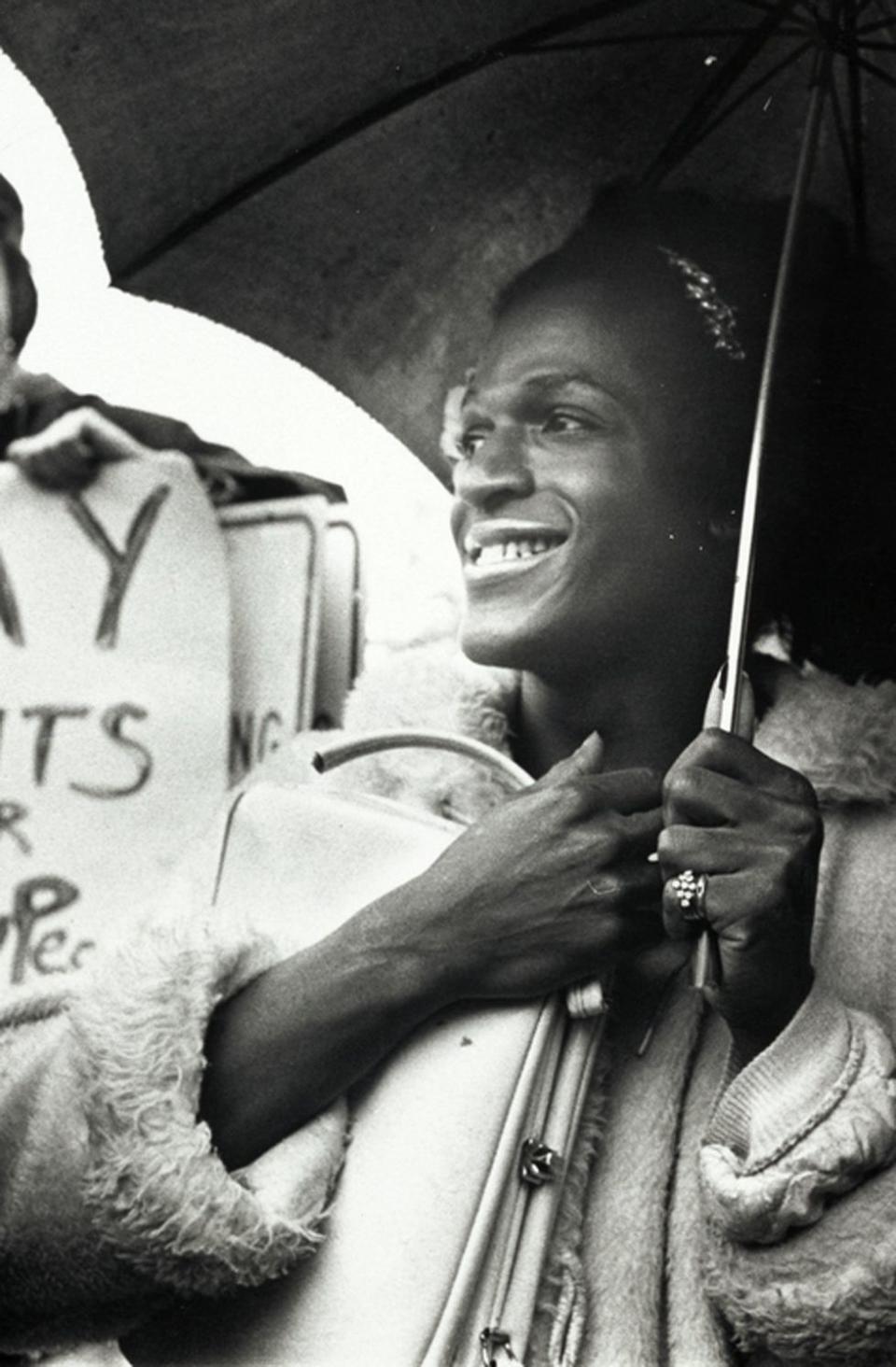
NYPL Digital Collection
Marsha P. Johnson was a key participant in the 1969 Stonewall uprising against police harassment. While she identified as a drag queen in her lifetime, Johnson is considered a mother of the transgender movement and a pivotal figure in launching the modern battle for LGBTQ+ rights. Her middle initial stood for "Pay It No Mind," which was what she said to people who asked about her gender. She was known as a "drag mother" who supported struggling youth in New York City, and she worked with another Stonewall veteran, Sylvia Rivera, to found Street Transvestite Action Revolutionaries. She marched in many Pride parades and protests, and she was such a leader of her West Village neighborhood that she became known as the "Mayor of Christopher Street." She died in 1992 under suspicious circumstances. Today the Marsha P. Johnson Institute advocates for Black trans people.
Sylvia Rivera

Roseleechs via Wikipedia
Like her friend Marsha P. Johnson, Sylvia Rivera played a major role in the Stonewall rebellion, and she fought for the inclusion of transgender people and other marginalized groups in a movement dominated by gay white men in the 1970s. “If it wasn’t for the drag queen, there would be no gay liberation movement. We’re the front-liners,” she said after grabbing the microphone at a 1973 New York City Pride event, where she had been discouraged from speaking. While calling herself a drag queen or transvestite, she is now understood as a transgender woman. In 1971, she and Johnson started Street Transvestite Action Revolutionaries and STAR House, which provided a home for those who had no other, and while Rivera was only 19, she became a mother figure to many clients. STAR House didn't stay open long, but in the 1990s Rivera founded another institution like it, Transy House, and lived there. The gay and lesbian movement had started to embrace trans people, and New York Pride organizers were thrilled to have Rivera back in their march in 1994. “the movement had put me on the shelf, but they took me down and dusted me off," Rivera told The New York Times in 1995. She died of cancer in 2002. Also like Johnson, she has an organization named for her. The Sylvia Rivera Law Project provides legal assistance and engages in political advocacy aimed at assuring that all people are free to self-determine gender identity and expression, regardless of income or race, and without facing harassment, discrimination, or violence. She is also the first trans activist to have her portrait displayed in the National Portrait Gallery.
Jean O'Leary

University of Southern California Digital Library
Jean O'Leary was a nun briefly, but when she left the religious life, the Catholic Church's loss was the gay and lesbian movement's gain. O'Leary, a lesbian, was a cofounder of National Coming Out Day, helped get homosexuality off the American Psychiatric Association's list of mental disorders, and helped organize the first meeting of gay and lesbian activists with White House officials; it took place in 1977, and the delegation met with Midge Costanza, a top aide to President Jimmy Carter. "Jean was really the one out there plowing new territory," her friend Sean Strub told the Associated Press upon O'Leary's death in 2005.. "At a time when a lot of the gay activist community couldn't be ambitious enough to think about having a meeting at the White House, Jean was out there pulling the strings to make it happen." She was also co-executive director of what was then the National Gay Task Force. She was a delegate to the Democratic National Convention in 1976, one of three out gay or lesbian delegates that year, and she was chair of the Democratic National Committee's Gay and Lesbian Caucus from 1992 to 2002. Her other accomplishments included running a public interest law firm and a political consulting company.
Virginia Apuzzo
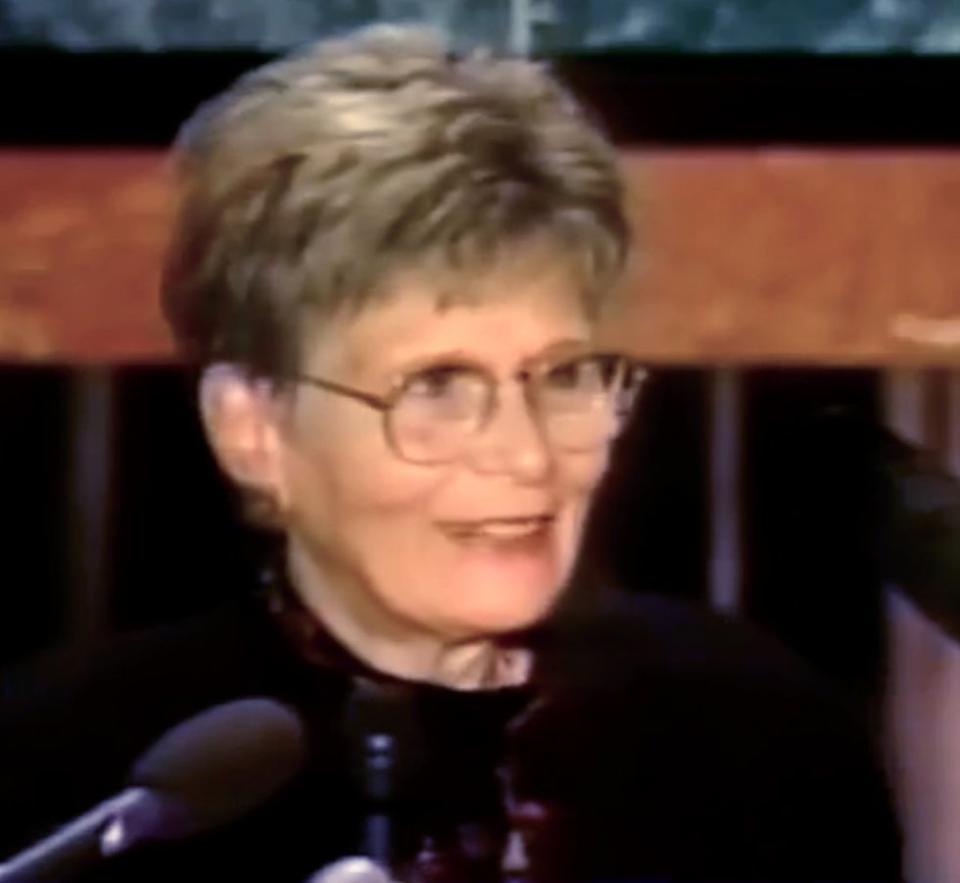
Via C-SPAN
Virginia Apuzzo, like O'Leary, was a nun briefly, but after hearing about Stonewall, Apuzzo left her convent and joined the burgeoning gay and lesbian rights movement. "I read about Stonewall in the newspaper," she recalled in a PBS documentary, "and I was very, very curious. Before I entered the convent at age 26, I'd had two lovers and knew I was a lesbian, but I tried to play by the rules. I thought I'd have to live my life with this deep dark secret." She realized she didn't have to, and she became active in politics, serving as a delegate to the Democratic National Convention and working to put a gay rights plank in the party platform. Early in the AIDS crisis, working for New York City's health department, she was an outspoken advocate for those affected, and she testified at the first congressional hearing on the epidemic, denouncing the federal government's slow response. She was executive director of the National Gay and Lesbian Task Force from 1983 to 1985 and later served in President Bill Clinton's administration, first as associate deputy secretary of labor and then as assistant to the president for management and administration. Apuzzo moved to Florida in 2013 and is still with us.
Miriam Ben Shalom

Flickr/Hazteoir
Miriam Ben Shalom, discharged from the U.S. Army for being a lesbian, was the first service member to win reinstatement after being kicked out because of their sexual orientation. She sued after being discharged in 1975. A judge ordered her reinstatement in 1980, but the Army appealed, and she was finally allowed rejoin in 1987 to finish her original tour of duty. When that was up in 1990, she tried to reenlist, and the Army fought her again. "I eventually lost at the Supreme Court. which declined to hear my case without prejudice," Ben Shalom wrote in an Advocate commentary in 2011. She went on to teach English at Milwaukee Area Technical College, but her activism on behalf of LGBTQ+ troops continued. She protested at the White House in 1993, when President Bill Clinton was trying to lift the ban on lesbian, gay, and bisexual service members but settled for the compromise of "don't ask, don't tell." She was back in 2010, handcuffing herself to the White House fence along with several others to push President Barack Obama on the repeal of DADT, which finally happened under his watch.
Urvashi Vaid
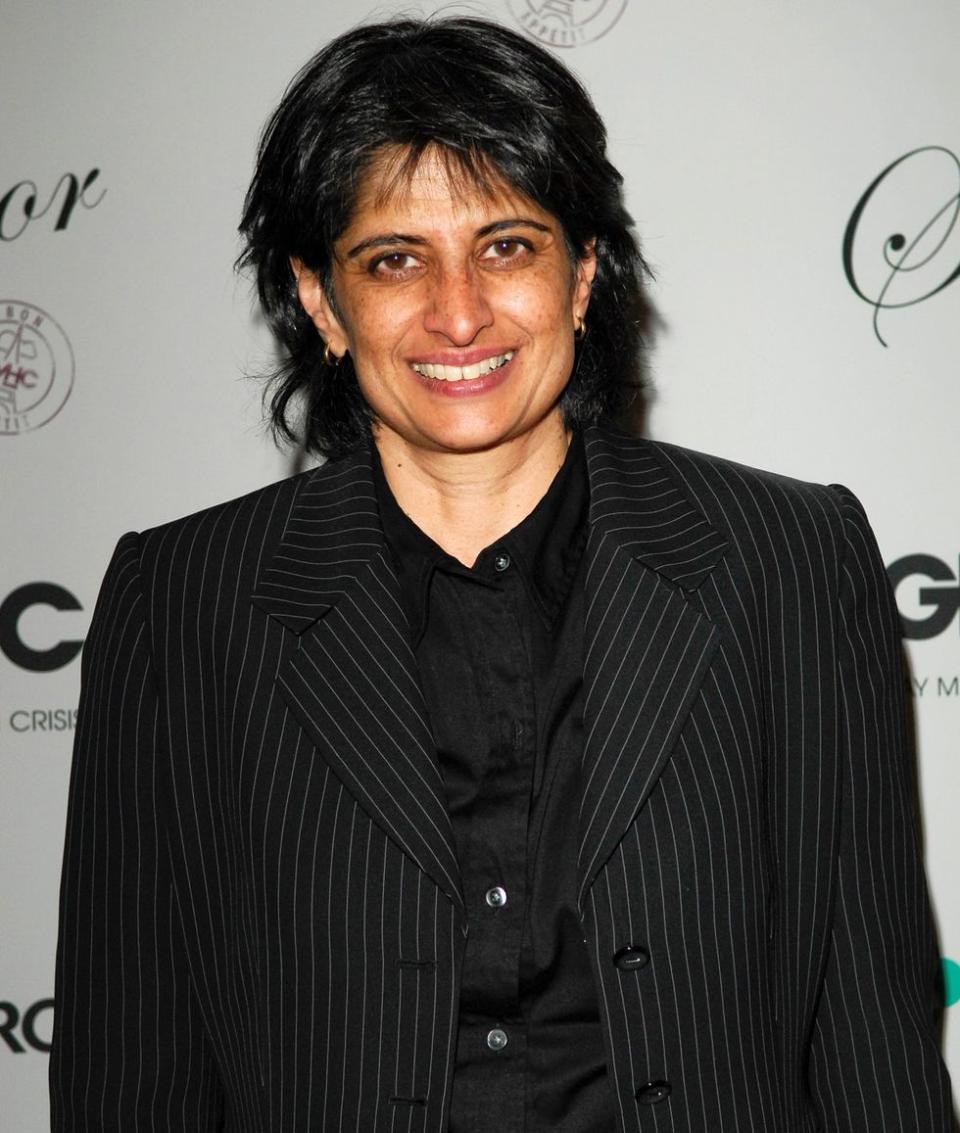
Ray Tamarra/Getty Images
Urvashi Vaid is a legend in the LGBTQ+ rights movement. Vaid, who died in 2022 at age 63, is most remembered for her work with the National Gay and Lesbian Task Force (now National LGBTQ Task Force), but her career included a variety of other organizations. She began her career as a staff attorney at the National Prison Project of the American Civil Liberties Union, where she initiated the group's work on HIV and AIDS in prisons. She spent 10 years at the Task Force in various positions, including executive director from 1989 to 1992, and was cofounder of its Creating Change conference. In 1990, she made a statement at President George H.W. Bush's speech on AIDS with a sign: "Talk Is Cheap, AIDS Funding Is Not." Her critique made waves, disrupting the press conference and shedding light on the failures of the Bush administration. Vaid was executive director of the Arcus Foundation, a global funder of LGBTQ social justice and great ape conservation, from 2005 to 2010. She was deputy director of the Governance and Civil Society Unit of the Ford Foundation from 2001 to 2005, and served on the board of the Gill Foundation from 2004 to 2014. In 2012, she launched LPAC, the first lesbian super PAC, and it has since invested millions of dollars in candidates who are committed to social justice through legislation. She was most recently president of the Vaid Group, a social innovation firm working with global and domestic organizations to advance equity, justice, and inclusion. She was also an author, an Advocate columnist, and the life partner of lesbian comic Kate Clinton. "Urvashi Vaid was a leader, a warrior, and a force to be reckoned with," the Task Force's current executive director, Kierra Johnson, said upon Vaid's death. "She was also a beloved colleague, friend, partner, and someone we all looked up to — a brilliant, outspoken, and deeply committed activist who wanted full justice and equality for all people."
Kate Kendell

Ilya S Savenok_Getty Images for Lambda Legal
Kate Kendell was executive director of the National Center for Lesbian Rights (which serves all LGBTQ+ people) for 22 years, overseeing many LGBTQ+ rights victories and exponential growth. She graduated from law school in 1988 and worked for a time as a corporate attorney before becoming the first staff attorney for the American Civil Liberties Union of Utah in 1992. In 1994, she joined San Francisco-based NCLR as legal director, then became executive director in 1996. NCLR won the California marriage equality case in 2008 and was later part of the team of attorneys to secure national marriage equality in the U.S. Supreme Court case Obergefell v. Hodges. In 2017, NCLR won a U.S. Supreme Court victory in Pavan v. Smith, in which the court ruled that states had to list both same-sex parents on birth certificates. NCLR and GLBTQ Legal Advocates and Defenders were the first to file a federal lawsuit challenging Donald Trump’s transgender military ban. During Kendell’s tenure, NCLR’s budget grew from $500,000 to more than $5 million, the number of staff members increased by five times, and the group added a Washington, D.C., office. Kendell left NCLR in 2018 and is now chief of staff at the California Endowment, which works for health equity in the Golden State.
Margarethe Cammermeyer
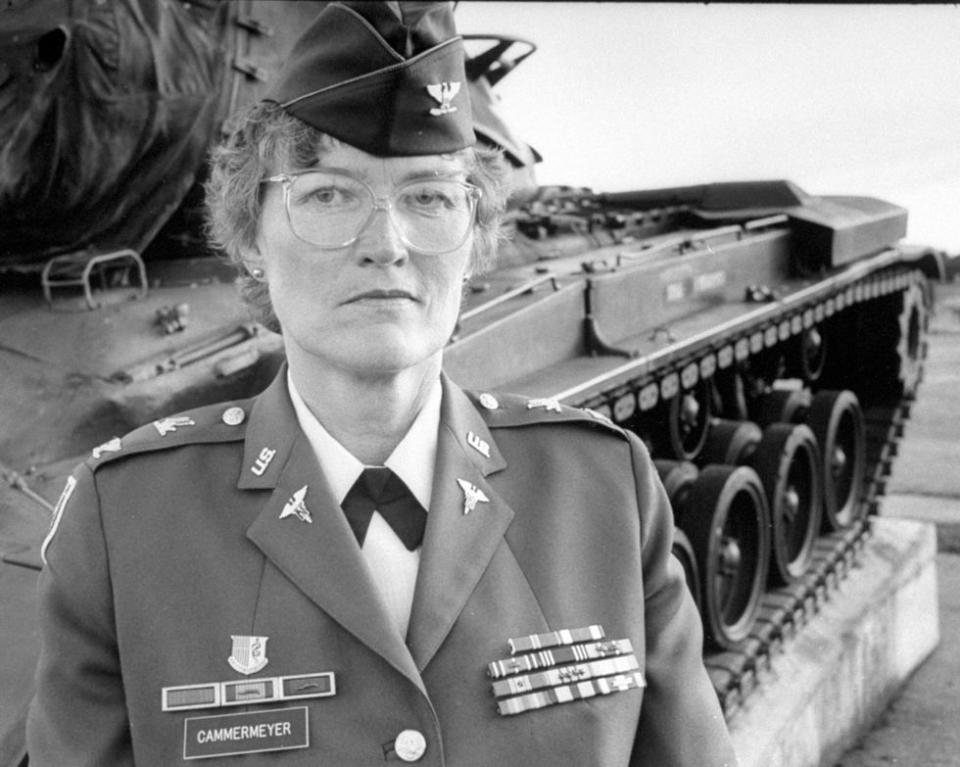
Kim Komenich/Getty Images
Col. Margarethe "Grethe" Cammermeyer was the highest-ranking military member ever to be discharged under the strict ban on gay, lesbian, and bisexual service member that preceded "don't ask, don't tell." She had been an Army nurse serving in Germany, the U.S.. and Vietnam, and in 1988, she disclosed she was a lesbian, as part of the process for a security clearance. She was dishonorably discharged but fought back and won reinstatement. She continued to serve until retiring in 1997 with full benefits and privileges. After DADT was implemented in 1993, Cammermeyer spent 17 years advocating for its repeal. She led the Pledge of Allegiance at the ceremony where President Obama signed the repeal bill in 2010. She eventually became a hospital commissioner with WhidbeyHealth Medical Center in Washington State. She told her story in the autobiography Serving in Silence, also the title of a TV movie in which Glenn Close portrayed Cammermeyer.
Roberta Kaplan
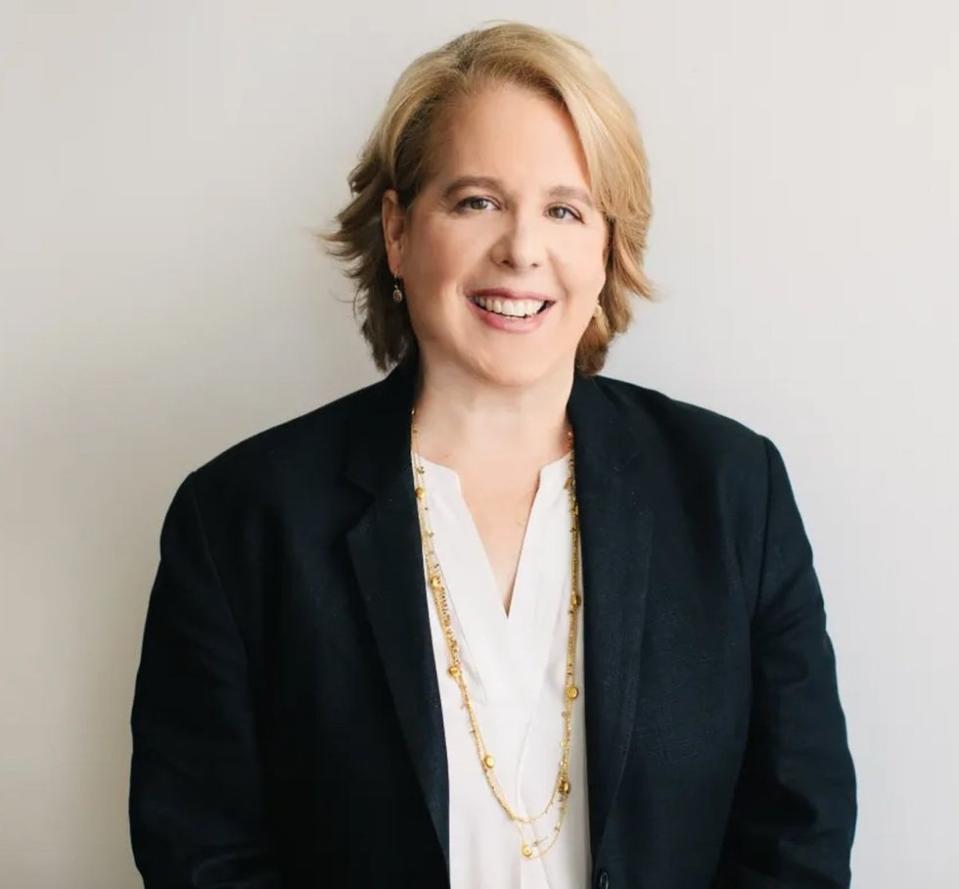
Sylvie Rosokoff for Kaplan Heckler & Fink LLP
Attorney Roberta Kaplan is best known for representing lesbian widow Edie Windsor in the case that led the U.S. Supreme Court to strike down the main portion of the Defense of Marriage Act — the section that denied federal government recognition to same-sex marriages — in 2013. Windsor and Thea Spyer became partners in the 1960s and were finally able to marry in Canada in 2007. But the U.S. did not recognize their marriage, with the result that when Spyer died two years later, Windsor owed $363,000 in estate taxes — which she would not have owed if she had been married to a man. In representing Windsor, Kaplan kept the focus on her client, although Kaplan has won plaudits for her courtroom performances. She recalled that when she argued the case before the Supreme Court, only nine states had marriage equality, but that number grew to 17 within a year due to court decisions relying on the ruling in Windsor's case. Kaplan has continued fighting for LGBTQ+ rights. When she argued against Mississippi's marriage ban in 2014, one court observer said, "Watching the brilliant Roberta Kaplan and the State's attorney argue this case is like watching Aretha Franklin versus a drunk, bumbling fraternity guy in a singing contest." Her reputation was somewhat sullied by the revelation that she had advised New York Gov. Andrew Cuomo's staff on responding to sexual harassment accusations, and she resigned as cochair of the board of anti-harassment group Time's Up in 2021. However, she remains an advocate for LGBTQ+ causes. Last year she was urging Congress to pass the Respect for Marriage Act, which it did, writing marriage equality into federal law to protect it in case the Supreme Court overturns Obergefell v. Hodges.
Mary Bonauto

John D. and Catherine T. MacArthur Foundation
Mary Bonauto is another legendary marriage equality attorney. She argued Obergefell v. Hodges before the U.S. Supreme Court, resulting in the 2015 ruling for nationwide marriage equality, and her career has encompassed many more LGBTQ+ rights victories. She has been an attorney at Boston-based GLAD (GLBTQ Legal Advocates and Defenders, formerly Gay and Lesbian Advocates and Defenders) since 1990 and has litigated and done policy work in every New England state. Before Obergefell, she won several cases for relationship recognition, first civil unions, then equal marriage rights. She and two other lawyers won a 1999 ruling in Baker v. State of Vermont, leading to the nation’s first civil union law, and she was lead counsel in Goodridge v. Department of Public Health, which in 2004 made Massachusetts the first state with marriage equality. She was then co-counsel in Kerrigan v. Department of Public Health, a successful marriage case in the Connecticut Supreme Court. She led GLAD’s federal court challenges to the Defense of Marriage Act, which resulted in the first federal court rulings against DOMA, and she has also argued cases for parenting rights and transgender equality. Her policy work includes advocating for a variety of measures to benefit LGBTQ+ people, including conversion therapy bans. Shortly before she argued Obergefell, fellow attorney Evan Wolfson praised her in an Advocate commentary piece: "There is no one more fitting to be standing before the court on behalf of all of us than Mary. We couldn't be in better hands."
Sarah Kate Ellis
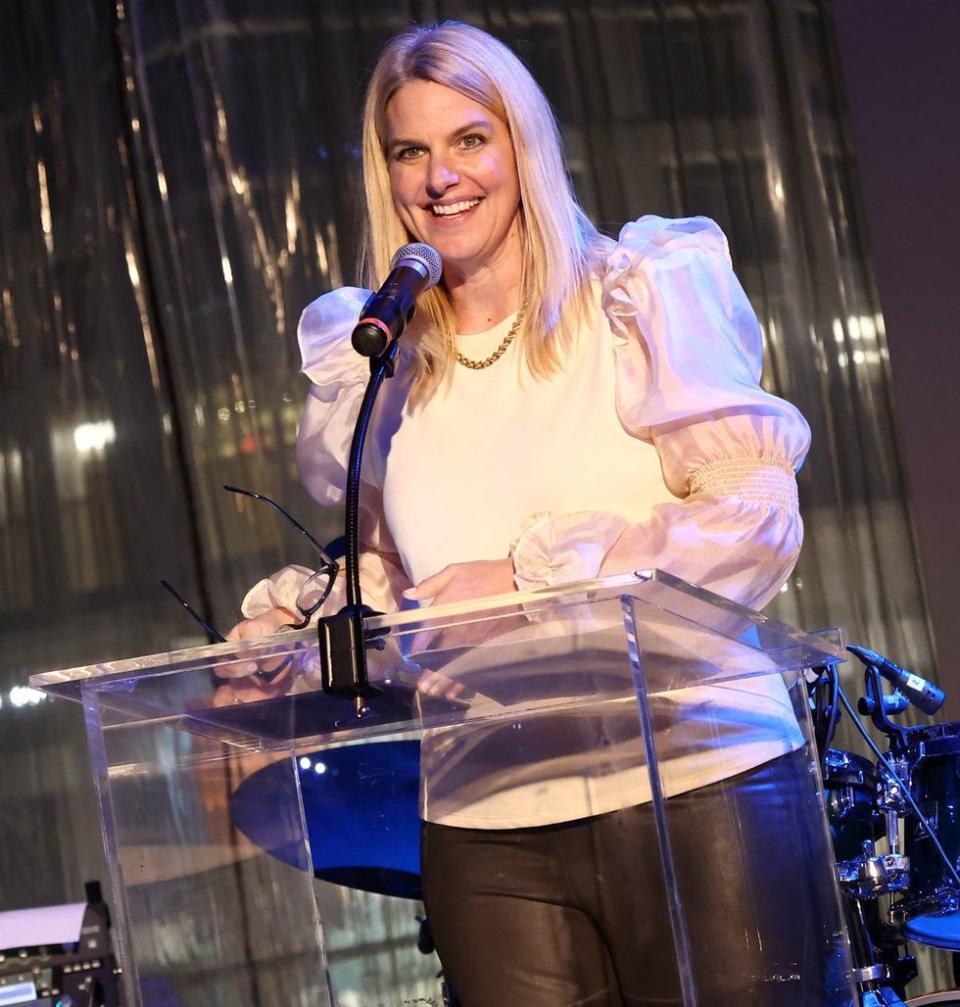
Tommaso Boddi/Getty Images for GLAAD
GLAAD President and CEO Sarah Kate Ellis is one of the highest-profile LGBTQ+ leaders today. She joined GLAAD in 2014 after a successful career as a media executive at Martini Media, Time Inc., and Condé Nast. At GLAAD, she commissioned the annual "Accelerating Acceptance" report, providing a window into national sentiment toward the LGBTQ+ community. While GLAAD continues its mission of advocating for fair portrayals of LGBTQ+ people in media, it is also fighting discriminatory legislation around the nation, and Ellis has recruited celebrities to speak out on this subject as well as sending GLAAD representatives to states where such legislation is pending. GLAAD's most recent actions include bringing together more than 100 organizations, activists, journalists, and celebs to protest anti-transgender bias in The New York Times. Ellis and her wife, Kristen Ellis-Henderson, are authors of the memoir Times Two: Two Women in Love and the Happy Family They Made, and they appeared in the cover of Time under the headline “Gay Marriage Already Won.”
Kierra Johnson

Twitter/KierraDC
The National LGBTQ Task Force has had many history-making executive directors, and Kierra Johnson is continuing that tradition. In February 2021, she became the National LGBTQ Task Force's first Black executive director. Johnson, who is bisexual, was previously the organization's deputy executive director and also served on its board of directors and National Action Council. She is dedicated to keeping the Task Force's work intersectional, with campaigns for LGBTQ+ visibility in the Census and for abortion rights and voting rights. After Roe v. Wade was overturned by the U.S. Supreme Court in 2022, the Task Force organized a diverse group of men to speak out on why cisgender men should care about abortion rights. "If cis men ... think this decision will not affect them, they need to think again," she said at the time. "Restrictions on a person's access to abortion is a willful denial of their humanity, their intelligence, and family circumstances. Restrictions on access to PrEP is an implied devaluing of our health, safety and a passive attempt on our lives. Outlawing love, relationships, and the building of families is an outright assault on our children and the spirit that binds our communities. These laws, rules, and statutes are all attempts by extremist politicians to conquer our spirit, and claim sovereignty over our bodies ... our lives. Access to health care is a racial justice issue. Living free from discrimination is an LGBTQ+ issue. Having full access to participate in and thrive in our democracy is a civil rights issue. Our fundamental rights are at stake. We need the power of our collective community to mobilize and respond to current attacks and actively participate in the long-term struggle for agency, freedom, and justice."
Imani Rupert-Gordon

NCLR
Imani Rupert-Gordon became executive director of the National Center for Lesbian Rights in 2019, succeeding Kate Kendell, who, she said, left her a strong legacy to build on. One of the things she's building on is intersectionality. "We are at an incredible time in the movement," she told The Advocate when she was named executive director. "We're in a position to fundamentally shift the direction of the movement. It has to be a racial justice movement, it has to be an economic justice movement, it has to be a gender justice movement." She is the first Black woman to head the group and the first with a background in social work. "I may be first [Black woman at NCLR's helm], but I won't be the last," she said at the Creating Change conference in 2021. "What we can do to make that a reality is to make changes that are transparent, and changes to tackle some of the most underrepresented issues within the Black community. We need to ask people that we haven't asked before what the solutions to our problems are — let's make it better." She was one of The Root 100 that year, a list that recognizes top Black leaders. The blog praised her work in intersectionality, such as mobilizing the organization to speak out against police violence after the killing of George Floyd in 2020.
Kelley Robinson

Facebook/hrcpresident
Kelley Robinson made history in 2022 by becoming the first Black woman to lead the Human Rights Campaign, the nation's largest LGBTQ+ rights organization. Robinson came to HRC from the Planned Parenthood Action Fund, where she had been executive director since 2019; she had previously held other positions with Planned Parenthood and had been an organizer for Barack Obama. "I'm entering this role with a deep commitment to leading with equity" and to "building an organization that is as inclusive as the people we're fighting for," she told The Advocate when she was announced as HRC's new president. She is leading HRC at a challenging time — the U.S. has an LGBTQ-supportive president, Joe Biden, but a right-wing backlash has resulted in hundreds of anti-LGBTQ+ bills in state legislatures, plus there's a conservative Supreme Court ready to revoke rights. "It's time for us to fight back in ways that are bigger and bolder than what we've ever done before," she said in her Advocate interview. "I'm not looking for supporters anymore -- I'm looking for champions." Under her leadership, HRC is fighting against anti-equality efforts across the nation. As the Respect for Marriage Act moved ahead in Congress last year, she emphasized that while it represented important progress, our movement's work is far from done. "Even though this bill is historic, and it's so important and meaningful for millions of people in this country, it also doesn't change the reality that so many LGBTQ+ people are living in states and communities where they are experiencing fear," she said in a video interview with The Advocate's Tracy E. Gilchrist. "We are experiencing a crisis. I mean, we just saw the violent attack at Club Q. ... And we continue to see violent political rhetoric from politicians and, you know, political pundits like Tucker Carlson, and all of that is leading to real-life violence in our lives. ... This fight is far from over, and we have to make sure we're looking directly at the states and particularly the actors and the people that are putting these bad bills forward."

